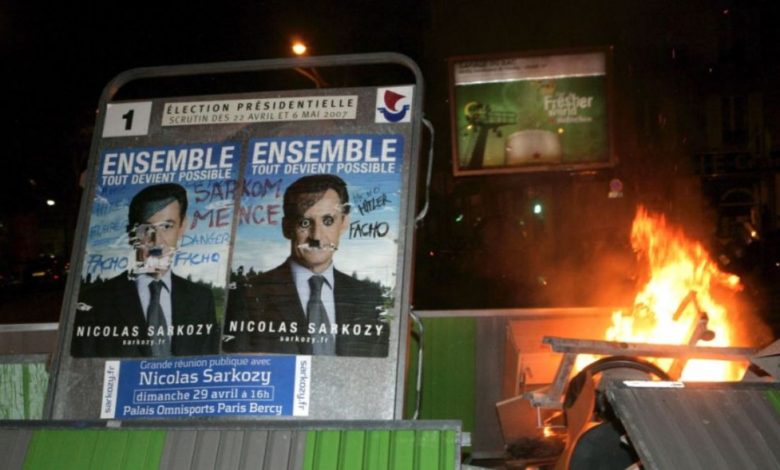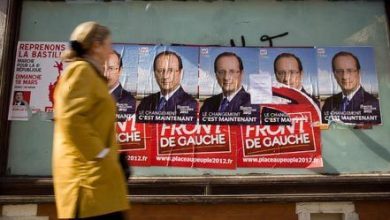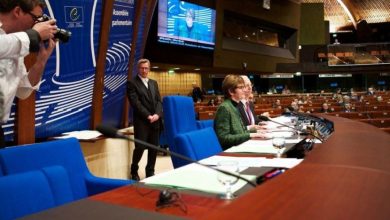Chirac changer will begin the promised revolution after vacation
Dissent France celebrates victory of the right by night pogroms. Sarkozy on an advertising poster with painted mustache.
Late Sunday night, the French national anthem, along with Mireille Mathieu, was sung by 30 thousand people gathered in the most famous of Paris’s squares – Place de la Concorde, to celebrate the election of Nicolas Sarkozy to the presidency. The festivities continued until late at night. The highlight of the program was the appeal of the new president, who came here after meeting with his supporters from the political and cultural elite in the Fouquet restaurant on the Champs Elysees. Any doubts about who will become the new president fell away immediately after the closing of the last polling stations – the advantage of the right-wing politician was obvious.
Addressing the French on the Place de la Concorde, Sarkozy called on fellow citizens for unity and solidarity: “Democratic France won today! I ask all of you to be generous and generous, tolerant of the ideas of others. I want France to be united so that no one feels like a loser. Victory, my friends, is joyful when it is generous, when there is no thirst for revenge in it. I appeal to those who did not vote for me – I respect you, and promise that I will serve all, without exception, the French. Any honest hard worker in this country deserves respect. Addressing you from the Place de la Concorde, I give my word that I will not betray and will not disappoint you. I promised to fight unemployment, contribute to the growth of the economy, the greatness of our country – and I will fulfill my promises. I urge you to love and serve our country. “France has given me everything – and it is time for me to pay her debt!”
Sarkozy also promised to return to the French pride in his country, once again making it a leading European and world power.
At the same time, several thousand dissatisfied with the election results gathered at Bastille Square. There was also an aggressive-minded youth who threw stones and incendiary bombs at the police. Guards in response mobilized water guns and tear gas. Performances of the discontented, accompanied by acts of hooliganism, were recorded in many other cities of France. During the night more than 350 cars were set on fire, several hundred hooligans were detained. Smutyanov was not stopped by the fact that Segolen Royal had already admitted defeat by that time, and her party had urged all the French to remain calm.
Disappointment and despondency reigns in the camp of the left. Socialists are trying to understand the reasons for the loss and draw lessons for the future. Many party leaders have already recognized the obvious – many mistakes were made in the Royal campaign. The head of the socialists and civil husband Royal Francois Hollande said that she was not specific enough in her promises. Far more critical were left-wing leaders such as Laurent Fabius and Dominic Strauss-Kahn, who competed with Royal for the right to become a candidate for the Socialist Party in the presidential election. This is how former finance minister Stros-Kahn explains the reasons for the left’s defeat, indicating that France will have a right-wing president for the third time in a row: “Why did we lose again? Because they did not modernize the party. For the past five years, socialists have been comforted by winning regional or European elections – but then voters simply showed their distrust of Chirac. In an ever-changing world, the French cannot support those leftists that were 20 years ago. In the context of globalization, the program of the left must finally change. ”
Oddly enough, the candidate herself was the most optimistic and by no means broken this evening. “Do not lose hope, do not lose your enthusiasm. New challenges await us. I intend to continue the battle we have begun. Our actions will bear fruit – I am sure of that. Together we embody the hope of the best. Long live the republic and long live France, ”she said to her supporters who had come to the headquarters of the socialists.
By new tests, the socialist meant the elections to the National Assembly, which will be held on June 10 and 17. The composition of the new government will depend on their outcome. It is extremely important for the president to have a loyal parliament, so that summer elections will become as important for determining the country’s political course as presidential elections.
However, the new head of state will not wait for their outcome to get to work. The mandate of Jacques Chirac expires on May 16, and on that day his duties will be transferred to Sarkozy. He declares that he does not intend to abandon the constitutional structure of the Fifth Republic, but will make some changes to the fundamental law. In particular, the powers of the president will be slightly cut, and the rights of parliament will be somewhat expanded. Sarkozy also intends to reduce the composition of the government from 23 to 15 ministers. He intends to establish parity between men and women in the cabinet of ministers, and invite not only the right, but also the centrists and even some of the left to ministerial posts.
Among his immediate priorities, the newly elected president named the reform of labor legislation, the beginning of negotiations with Brussels to resume work on the European constitution, toughening sanctions against offenders and reducing immigration. Before taking up his duties, Nicolas Sarkozy took a short vacation.
So, what conclusions should be drawn from this presidential campaign? The French political scientist Pascal Perrino believes that the 2007 campaign reflects the serious changes that have occurred in relation to the French towards politics and politicians: “Since the 1980s, the French used to update state structures during elections: if the right were in power, they chose the left and vice versa. This concerned both presidential and parliamentary elections. In 2007, they elected a person from the ruling party who held key posts in the outgoing government as president. This shows that there was a turning point in the behavior of voters. The French forgot about their dissatisfaction with the outgoing government and trusted one of its representatives. Changes in the behavior of the electorate are also evidenced by the growing turnout of voters and their behavior in the first round. If earlier voting in the first round was primarily a protest – people voted a lot for extremists of various kinds, this year this did not happen. All these signs indicate that we are entering a new political era.”
This post is also available in:
 English
English  Русский (Russian)
Русский (Russian)





